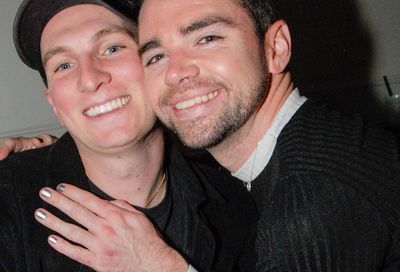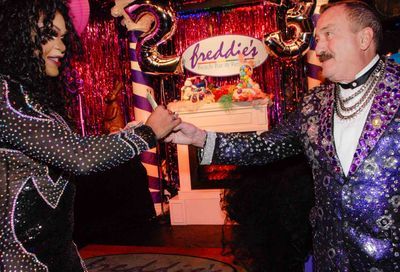Dual Disappointment
Book of Days, Jump/Cut
Neither Arena Stage nor Woolly Mammoth & Theater J can salvage new works that need more time on the drawing board
 Costumed crusader: Mudge (Photo by Scott Suchman) |
Who knew there was so much intrigue to be found in cheese?
In the fictional small town of Dublin, Missouri, the setting of Lanford Wilson’s latest work Book of Days, cheese is what keeps the economy pumping. The local cheese plant owner Walt (Jack Willis) is content to leave the factory in the managerial hands of Len (Brian Keane), a cheese connoisseur who’s gradually winning Walt over to a plan to convert the plant from high-volume production for Kraft to smaller-scale artisan cheeses.
But this doesn’t sit well with Walt’s son James (Scott Janes), a lawyer and aspiring politician who’s turned his back on the family business, but still wants to see it kept simple after his father dies “accidentally” while duck hunting during a tornado. James wrenches control of the plant from his mother Sharon (Jade Wu) and immediately sets out to sell it to fund a divorce from his uptight wife Louann (Monette Magrath) so he can marry his true love, a hairdresser in nearby Springfield carrying his child.
If this all sounds rather bizarre and potboiler-ish, well, it is. And it gets even moreso when Len’s wife Ruth (Jennifer Mudge), the plant bookkeeper and budding community theatre diva who lands the lead role in a local production of George Bernard Shaw’s Saint Joan, becomes increasingly Joan-like in real life as her suspicions about Walt’s death lead her to question the conservative Christian culture that dominates the town.
There’s nothing wrong with bizarre. There is, however, something wrong with boring — which is what Book of Days becomes in a drawn-out second act lacking virtually all of the lively momentum that director Wendy C. Goldberg shapes in the first act of this Arena Stage production.
|
Blame Wilson, in part, for abandoning his device of shorter scenes punctuated with date announcements to enforce a sense of the timeline during which Dublin falls apart at its unseemly seams. In the second act he goes for longer analysis of small-town hypocrisy that offers few surprises and puts a strain on the cast, many of whom, under closer scrutiny, reveal a more shallow grasp of their roles than their colorful characters call for.
Mudge, for instance, looks sillier and sillier as she adopts the look of Joan of Arc — bobbed hair and leather boots, only paired with jeans here — but unconvincingly expresses the blurring of her reality with the world of Saint Joan that, along with Walt’s death, preoccupies her. It’s a critical misstep that mars Ruth’s confrontation of the congregation of the evangelical church who she accuses of harboring the person she suspects of murdering Walt.
Then again, the congregation — including James, Sharon, Louann, the smarmy Reverend Groves (David Fendig) and the ineffective Sheriff Atkins (David Toney) — responds to a woman waving a sword at them by going into a prayerful frenzy instead of having her arrested. How seriously can you take Wilson’s critique of conservatism if this is as much intelligence as he invests such characters with?
Keane fares better in a subtler take on the level-headed Len, although Linda Stephens becomes an annoyance in a single-note rendition of his mother Martha, a closeted liberal dean at a Christian college who reveals her disdain for conservative culture by tossing off overdramatic references to Woodstock, sex and pot that suggest Wilson has no real interest in intellectual discourse from either side of the conservative-liberal ideological divide.
Magrath manages a good deal of mileage out of Louann as she lets down her conservative guard in response to James’s philandering. Susan Lynskey, too, is a treat as Ginger, another woman scorned in the wake of her affair with the big-time director Boyd (Mark Pinter, in a stronger performance than his tritely shaped character deserves), who’s been hired for Saint Joan.
Willis is fascinating, but seen too briefly, as the brash Walt. Wu never taps into anything significantly beyond rote line delivery as Walt’s wife, although there’s clearly a much more fascinating woman there for her and Goldberg to explore. Likewise, Janes’s rendition of the pivotal James loses steam as the stakes for his character are constantly ratcheted up without an appropriately visible effect in his slick demeanor.
|
Woolly Mammoth Theatre Company and Theater J have tackled Jump/Cut, a new play by Neena Beber, as a co-production for the work’s world premiere. The result, under the direction of Leigh Silverman, is a slow-to-build contemporary tale of an aspiring novelist, Dave (Michael Chernus), plagued by manic depression and seeking refuge with his lifelong friend, aspiring filmmaker Paul (Eric Sutton).
Shortly after Dave is in residence on Paul’s sofa, into the picture waltzes Karen (Colleen Delany), a grad student and once-aspiring screenwriter who becomes Paul’s live-in girlfriend. The trio eventually undertakes a documentary project with Dave and his mental illness as the main subject, with predictably life-altering results.
Beber makes it hard to invest fully in the characters and their situation, since she gives a fairly detailed account of what Paul and Karen have put into their careers and independence, but asks us to sympathize with the supposedly brilliant Dave without showing that he’s ever done anything for himself other than resist medical treatment and live off a trust fund.
It’s an oversimplified characterization that’s even harder to stomach when Beber’s reference to Paul and Dave’s college senior year in “the high ’80s” — apparently ignored by Silverman in casting and direction — places the two men at a minimum age of 35, well beyond a commonly accepted zone of tolerance for the kind of precocious soul-searching on display.
Support Metro Weekly’s Journalism
These are challenging times for news organizations. And yet it’s crucial we stay active and provide vital resources and information to both our local readers and the world. So won’t you please take a moment and consider supporting Metro Weekly with a membership? For as little as $5 a month, you can help ensure Metro Weekly magazine and MetroWeekly.com remain free, viable resources as we provide the best, most diverse, culturally-resonant LGBTQ coverage in both the D.C. region and around the world. Memberships come with exclusive perks and discounts, your own personal digital delivery of each week’s magazine (and an archive), access to our Member's Lounge when it launches this fall, and exclusive members-only items like Metro Weekly Membership Mugs and Tote Bags! Check out all our membership levels here and please join us today!



















